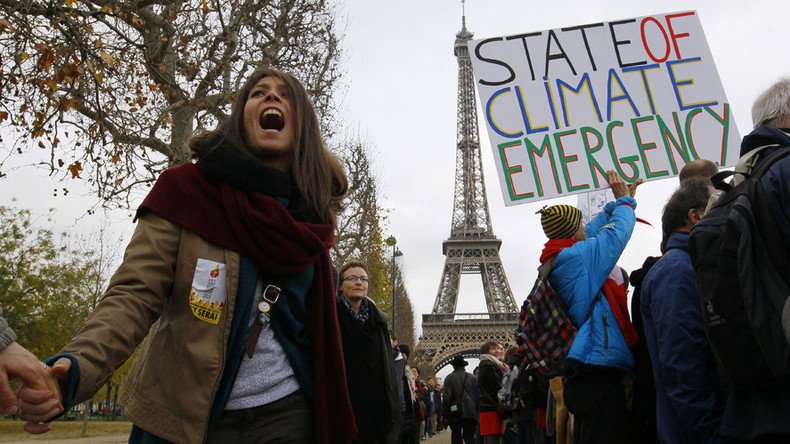‘Historic accord’ on climate adopted, activists in Paris denounce deal as ‘weak’

An agreement on what has been dubbed a “historic” package of measures on capping rising temperatures worldwide has been signed at Paris summit. While it for the first time obliges states to limit global warming to 2 degrees Celsius, activists say it's not enough.
The 31-page draft of the "Paris Agreement" stated that it "aims to strengthen the global response to the threat of climate change in the context of sustainable development and efforts to eradicate poverty, including by holding the increase in the global average temperature to well below 2 degrees Celsius [3.6 Fahrenheit] above preindustrial levels and to pursue efforts to limit the temperature increase to 1.5 degrees Celsius [2.7 Fahrenheit]."
The document, presented to international negotiators on Saturday, suggests that the world urgently needs to increase "the ability to adapt to the adverse impacts of climate change and foster climate resilience and low greenhouse gas emissions development, in a manner that does not threaten food production."
Activists said the proposed limit was not enough to save the planet and deal with the problem of the climate warming.
World leaders boasting their climate deal. People continuing protest. #cop21 has failed us pic.twitter.com/TQd3Ibv6Xy#d12#redlines
— Freek Bersch (@freeksels) December 12, 2015"1, 2, 3 degrees. It's a crime against humanity!" is chant at #D12#COP21 concert and protest, Eiffel Tower. #1point5toStayAlive
— Lacy MacAuley (@lacymacauley) December 12, 2015The 195-nation accord was released after two weeks of high-level talks outside Paris, known as COP21. Previous attempts to reach such a deal have failed, and nearly 200 countries have spent four years negotiating the pact.
Huge turn out for the main protest of the day. Massive crowds forming chains around the park. #COP21pic.twitter.com/aKEwWTGazL
— David Johnson (@unkiedave) December 12, 2015"The world is holding its breath and counting on all of us," French Foreign Minister Laurent Fabius who presided at the talks said when delivering the draft to the ministers, as cited by AFP. Describing it as "an historic accord," the official was reportedly on the brink of tears.
Addressing the summit envoys, UN Secretary General Ban Ki-moon said: "The end is in sight. Let's now finish the job. The world is watching. Millions of people depend on your wisdom."
Inflatable blockades at the #COP21#d12 protest in #Paris@Ruptlypic.twitter.com/YZlqIZzyzt
— Jon Scammell (@JonScammell) December 12, 2015Seeking to end decades-long rows between rich and poor nations over how to fund the Earth-saving campaign, the Paris deal mobilizes a minimum of $100 billion a year from 2020 to help the developing world cope with global warming, according to Fabius.
We are the frontlines, We are the #Redlines, Protecting our Bloodline #D12#COP21 protest in Paris pic.twitter.com/DvKjv4kaV0
— Unicorn Riot (@UR_Ninja) December 12, 2015READ MORE: 200+ detained, tear gas & scuffles at banned Global March for Climate in Paris (VIDEO)
Timed to coincide with the end of Paris talks and to attract even more attention to the threat of the man-made global warming, activists gathered in the French capital on Saturday, with protesters marching towards the Eiffel Tower. The demonstration had been authorized by police, organizers said.
30 Greenpeace activists scale Paris Arc de Triomphe in renewable energy protest (IMAGES) https://t.co/pqkur4ne0Gpic.twitter.com/j3KbBGFrep
— RT (@RT_com) December 11, 2015Earlier Paris protests had been banned during the state of emergency following November 13 terror attacks on the French capital. The rally then ended in clashes with police, with tear gas being fired and many arrested. Elsewhere in the world, tens of thousands took to the streets against climate change on the eve of the UN summit, making the action the biggest set of global marches in history, according to organizers.
Head off! Polar bears having a break at paris climate protest. @350#12d#cop21pic.twitter.com/dy0OBZUteS
— Ruth Krause (@Ruth_Krause) December 12, 2015Prior to the Paris talks, most countries submitted voluntary pledges and measures to reduce their own CO2 emissions. The nations most vulnerable to climate change lobbied for the wording in the final pact to limit warming to 1.5 degrees Celsius, while states like China, India and Saudi Arabia asked for a higher ceiling. The UN sought to impose top-down targets.












